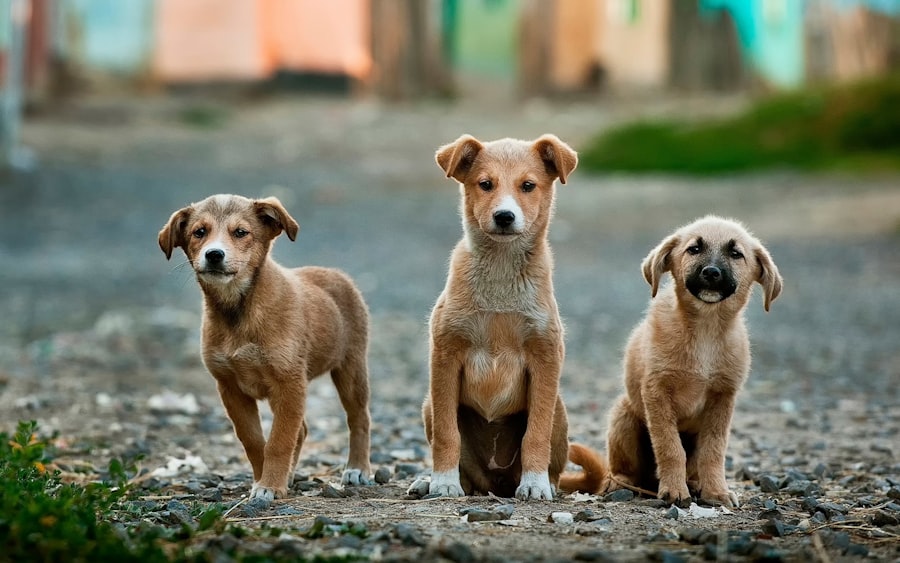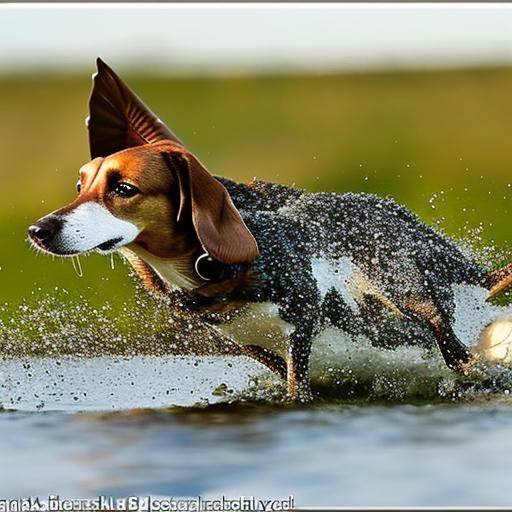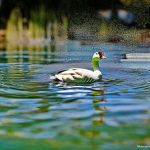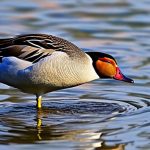Dog behavior can be complex and varied, and one common behavior that many dog owners struggle with is their dog’s inclination to chase geese. While it may seem harmless or even amusing at first, there are risks associated with this behavior that both dog owners and the geese themselves should be aware of. In this article, we will explore the reasons behind a dog’s instinct to chase geese, the potential dangers involved, and how to train your dog to stop this behavior.
Key Takeaways
- Understanding your dog’s behavior is key to addressing any issues, including chasing geese.
- Chasing geese can be dangerous for both your dog and the geese, so it’s important to take steps to prevent it.
- Training your dog is crucial for their safety and the safety of others.
- Positive reinforcement techniques are effective for training your dog and building a strong bond with them.
- Creating a safe and secure environment for your dog can help prevent unwanted behavior.
Understanding the Reasons Behind Your Dog’s Behavior
Dogs have natural instincts that drive their behavior, and one of these instincts is the prey drive. This instinct is deeply ingrained in dogs as descendants of wolves, who were hunters by nature. When a dog sees a flock of geese, their prey drive can kick in, causing them to want to chase and potentially catch the geese.
Additionally, dogs are highly social animals and are often motivated by the desire to interact with other animals. When they see a flock of geese, they may see it as an opportunity for play or socialization. This can further fuel their desire to chase.
The Risks Associated with Chasing Geese
Chasing geese may seem like harmless fun, but it can actually pose risks for both the dog and the geese. For the dog, there is a risk of injury if they run into obstacles or if the geese become aggressive in response to being chased. Geese are known to defend themselves and their young aggressively, and a dog that gets too close may be pecked or bitten.
On the other hand, chasing geese can also be harmful to the geese themselves. The stress caused by being chased can disrupt their natural behaviors and potentially lead to injury or death. Additionally, if a dog catches a goose, it can cause serious harm or even kill the bird.
The Importance of Training Your Dog
Training is crucial for a well-behaved dog, and teaching them not to chase geese is no exception. By training your dog, you can help them understand what behaviors are acceptable and what are not. This will not only keep them safe but also prevent harm to other animals.
Training your dog not to chase geese also helps to establish you as the leader and reinforces their obedience. Dogs are pack animals and instinctively look to their leader for guidance. By teaching them to resist their natural instincts, you are asserting your role as the leader and strengthening your bond with your dog.
Positive Reinforcement Techniques for Training Your Dog
Positive reinforcement is a highly effective training technique that focuses on rewarding desired behaviors rather than punishing unwanted ones. When it comes to training your dog not to chase geese, positive reinforcement can be a powerful tool.
Start by teaching your dog basic obedience commands such as “sit,” “stay,” and “leave it.” These commands will form the foundation for training them not to chase geese. When your dog successfully follows a command, reward them with praise, treats, or playtime. This positive reinforcement will help them associate good behavior with rewards and encourage them to repeat it.
When it comes to specifically addressing the issue of chasing geese, you can use a similar approach. Whenever you see geese nearby, redirect your dog’s attention to you by using their name or a command they know well. When they respond and focus on you instead of the geese, reward them with praise and treats. Over time, this will help them learn that listening to you is more rewarding than chasing geese.
Creating a Safe and Secure Environment for Your Dog

Prevention is key when it comes to stopping your dog from chasing geese. Creating a safe and secure environment for your dog can help minimize the opportunities for them to engage in this behavior.
One way to create a safe environment is to ensure that your dog has a securely fenced yard. This will prevent them from being able to access areas where geese may be present. Additionally, make sure that any gates or entrances to your property are secure and cannot be easily opened by your dog.
If you live in an area where geese are common, consider using landscaping techniques to deter them from your property. Geese are attracted to open spaces with easy access to water, so planting dense shrubs or installing barriers can help make your property less appealing to them.
Using Physical Barriers to Keep Your Dog Away from Geese
In addition to creating a safe environment, physical barriers can be an effective way to keep your dog away from geese. One option is to use a long leash or tether when you are outside with your dog. This will allow you to have control over their movements and prevent them from getting too close to the geese.
Another option is to use visual or auditory deterrents. For example, you can hang shiny objects or wind chimes near areas where geese are likely to gather. The movement and noise will startle the geese and discourage them from coming near, reducing the temptation for your dog to chase.
The Benefits of Leashing Your Dog
Leashing your dog is not only a legal requirement in many areas but also a responsible way to prevent them from chasing geese. By keeping your dog on a leash, you have direct control over their movements and can prevent them from running off after geese.
Leashing your dog also allows you to redirect their attention and reinforce obedience commands when necessary. If you see geese nearby, you can use their name or a command like “leave it” to get their attention and prevent them from chasing. With consistent training and reinforcement, your dog will learn that they should listen to you even when tempted by the presence of geese.
The Role of Exercise in Reducing Your Dog’s Chasing Behavior
Exercise plays a crucial role in a dog’s overall well-being and can also help reduce their chasing behavior. Dogs that are well-exercised are generally calmer and more focused, making them less likely to engage in impulsive behaviors like chasing geese.
Make sure to provide your dog with regular opportunities for physical exercise, such as daily walks or runs. Engaging them in mentally stimulating activities, such as puzzle toys or training sessions, can also help tire them out and redirect their energy in a positive way.
Seeking Professional Help to Modify Your Dog’s Behavior
In some cases, modifying your dog’s behavior may require the assistance of a professional dog trainer or behaviorist. If your dog’s chasing behavior is persistent or poses a significant risk to themselves or others, it may be necessary to seek professional help.
A professional trainer or behaviorist can assess your dog’s behavior, identify any underlying issues, and develop a customized training plan to address the problem. They can also provide guidance and support throughout the training process, ensuring that you and your dog are on the right track.
The Importance of Consistency in Training Your Dog to Stop Chasing Geese
Consistency is key when it comes to training your dog not to chase geese. Dogs thrive on routine and clear expectations, so it is important to be consistent in your training methods and expectations.
Make sure that everyone in your household is on the same page when it comes to training your dog. Consistency in commands, rewards, and consequences will help reinforce the desired behavior and prevent confusion for your dog.
It is also important to be consistent in your own behavior and reactions. If you let your dog chase geese one day but scold them for it the next, they will become confused and may not understand what is expected of them. By consistently reinforcing the desired behavior and redirecting their attention away from geese, you can help your dog understand what is acceptable and what is not.
Chasing geese may seem like a harmless or amusing behavior, but it can pose risks for both your dog and the geese themselves. By understanding the reasons behind your dog’s behavior, training them using positive reinforcement techniques, creating a safe environment, and being consistent in your training efforts, you can help prevent your dog from chasing geese.
Remember, training takes time and patience, so don’t get discouraged if progress is slow. With consistent effort and positive reinforcement, you can help your dog overcome their instinct to chase geese and enjoy a safer and more harmonious relationship with wildlife. Take action today to ensure the well-being of both your dog and the geese they encounter.
If you’re struggling to keep your dog from chasing geese, you might find this article on poultrywizard.com helpful. It provides valuable insights on breeding guinea fowl and when they lay eggs, which can be a great alternative to geese. Understanding the behavior and needs of different poultry species can help redirect your dog’s attention and prevent any unwanted chasing incidents. Check out the article here for more information. Additionally, if you’re interested in creating a safe and comfortable space for your chickens, poultrywizard.com offers tips on building a chicken coop with nest boxes. Discover more about it here. For those looking for a charming farmhouse-style chicken coop, this article provides inspiration and practical advice.
FAQs
What is the best way to keep a dog from chasing geese?
The best way to keep a dog from chasing geese is to train them to obey commands such as “leave it” or “stay.” Consistent training and positive reinforcement can help prevent chasing behavior.
Why is it important to keep dogs from chasing geese?
Dogs chasing geese can cause harm to both the geese and the dog. Geese may become injured or stressed, and dogs may become lost or injured if they wander too far from their owner.
What are some other methods to prevent dogs from chasing geese?
Other methods to prevent dogs from chasing geese include using a leash or long line, providing plenty of exercise and mental stimulation, and using deterrents such as noise makers or sprays.
Can geese attack dogs?
Yes, geese can attack dogs if they feel threatened or if their young are nearby. It is important to keep dogs away from geese to prevent any potential harm.
What should I do if my dog does chase geese?
If your dog does chase geese, it is important to immediately intervene and redirect their attention. Use a command such as “leave it” and reward them for obeying. Consistent training can help prevent chasing behavior in the future.
Meet Walter, the feathered-friend fanatic of Florida! Nestled in the sunshine state, Walter struts through life with his feathered companions, clucking his way to happiness. With a coop that’s fancier than a five-star hotel, he’s the Don Juan of the chicken world. When he’s not teaching his hens to do the cha-cha, you’ll find him in a heated debate with his prized rooster, Sir Clucks-a-Lot. Walter’s poultry passion is no yolk; he’s the sunny-side-up guy you never knew you needed in your flock of friends!







